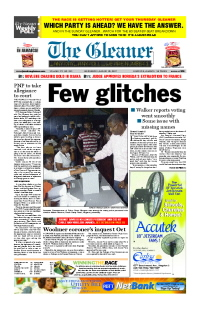Following the national election debates The Gleaner asked both main parties to provide documents expounding upon their economic policies. Part II saw the Jamaica Labour Party (JLP) respond to our request. What follows in Part I is the response of The People’s National Party (PNP) …
Balancing the Books, Balancing Lives
The People’s National Party (PNP) remains unapologetic in its commitment to creating a quality society in which Jamaicans co-exist in peace and are afforded opportunities to attain their full potential. It is the reason we strive for prudent management of the economy and progressive realisation of the quality society in which every Jamaican deserves to live. This is a society, which must be truly democratic in its processes, allows equitable access to resources, and assures citizens of their rights. In this people-centred quality society:
- We have a clearly defined sense of ourselves as a family with a shared vision that inspires everyone to strive for the best for self and country.
- The rule of law is observed and human rights and justice are guaranteed.
- Public resources are managed with transparency and accountability.
- High quality education, health care, and other social services are accessible to ALL, and
- People take personal responsibility for their lives.
As a diverse family, energised by mutual love and respect, we shape a future in which we conquer divisiveness, injustice, prejudice and poverty. This society cannot be wished or ‘promised’ into existence and we most certainly cannot achieve it in a climate of economic uncertainty. It requires an enabling environment comprising visionary, inspirational and committed leadership; a sound macro-economic framework; stable, safe and secure social conditions; strong social, cultural and human capital; and, mechanisms by which citizens can access services.
For the purposes of this article, we focus on the economic environment, especially as it relates to our pledge to fight poverty through the policies and programmes outlined in the manifesto. A central aspect which we explore here is the commitment to bringing people from the periphery into the economic net by providing opportunities through which they can be empowered to improve their lives.
The Economic Environment
The PNP believes economic policies and strategies should be focused on improving the lives of people – we cannot talk in any serious manner about guaranteeing people’s interests where economic uncertainty exists. We do not seek economic growth and stability as ends in themselves; we strive to achieve them so as to ensure we can better serve our people, especially the poor and vulnerable among us. That is why we focused first on creating stability, as this created the confidence that has led to record levels of local and foreign investment. Indeed, the unprecedented investment flows now provides Jamaica with the platform for rapid growth and job creation.
Strong Leadership for Real Challenges
While the base has been laid for the economy to thrive, there remains a major challenge – the reduction and subsequent elimination of the budget deficit. Contrary to the view of others, we believe deficit financing of social expenditure is unsustainable as it leads to higher interest rates and inflation. Higher interest rates increase the burden of servicing the national debt and squeeze the business sector, slow down economic growth and job creation. In practical terms, there is only one-way to achieve the objective: contain public expenditure within revenues. This allows interest rates to fall, thereby reducing interest payments, which in turn leads to improved funding availability for social interventions. Reduced interest rates also stimulate economic growth further by encouraging businesses to invest and in so doing facilitate job creation.
One of the most critical ways to get to the desired budget surplus is through increased ownership and participation of Jamaicans in the economy. While liberalisation of the economy has broadened participation, we acknowledge that it has not gone far enough to fully include average Jamaicans. Beyond liberalization, we intend to pursue democratisation of participation in the economy. This is consistent with a people-centred society and aims to broaden the range of Jamaican investors, owners, operators, and employees in the various industries. This is a critical aspect of our economic planning and is the basis on which we Jamaicans have painstakingly made the sacrifices, which have led to the solid macro-economic conditions we now enjoy. To this end, it is imperative that all the gains won to date be preserved.
In our early years in government we asked Jamaicans to “hold strain”, to be patient while we try to establish the foundations for a solid macro-economic programme. We had inherited an economy from the 1980’s with negative net international reserves of US$875 million; a fictitious foreign exchange market with an artificial exchange rate; and, the inability to borrow except from the multilateral financial institutions with the associated harsh conditions. Our reform of the sector included a market driven foreign exchange system, reflecting a true rate of exchange. At the same time inflation was tamed: seven of the last ten years inflation was under 10 per cent, dropping to a historic low of below 5.8% in 2006. This, like the current confidence in the Jamaican economy, credit worthiness, low interest rates, adequate financial reserves, and record levels of foreign direct investments, hold significant benefits for all segments of our society.
As we broaden participation in the economy, we broaden the producers and owners of wealth as well as sources of revenue for the economy. One will readily notice our manifesto’s emphasis on developing micro, small and medium businesses and the creation of a creative economy as two ways in which we will achieve economic democratisation. Correspondingly, this broadened participation in and ownership of wealth will contribute to the reduction in poverty to which we are committed.
Concomitantly, we have committed to the following as additional ways of improving our economy and ensuring improved management of resources:
1. Improve the level of efficiency of government ministries, statutory bodies, and public sector companies
2. Simplified, efficient and equitable tax system and a “wider” tax net.
3. Consolidated deductions from both employers and employees for NIF, NHT, HEART/NTA etc.
4. Provision of incentives for investments in the Creative economy, and emerging technologies in Agriculture and Energy diversification
5. Incentivising and building capacity for entrepreneurship among youth.
Fellow Jamaicans, let’s use our heads – nothing in life is free. The challenges faced by the Jamaican economy will not be met by leadership, which promises to spend more to solve each problem identified, even while lamenting the high national debt. Certainly the current global economic conditions will not find favour with the Opposition’s proposed approach and the implications for Jamaica’s debt.
Let’s work together in a practical, visionary way to shape our future together to maximise the solid base established for the growth, jobs and momentum we all desire for our country – advancing to the quality society.
 Few glitches - Walker reports voting went smoothly - Some issue with missing names
Few glitches - Walker reports voting went smoothly - Some issue with missing names
 Click here to listen to Power 106 FM online
Click here to listen to Power 106 FM online

